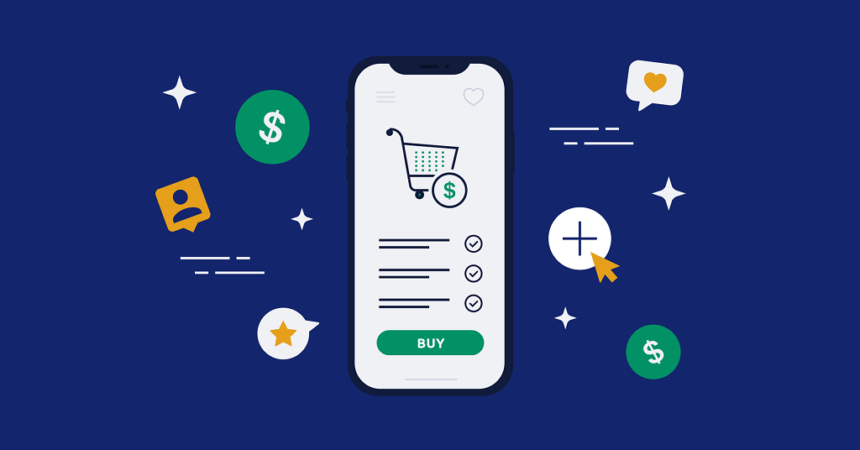Introduction
Over the last decade, the ecommerce business has grown dramatically, thanks in large part to technological developments. As businesses increasingly go online, the demand for fast, user-friendly, and scalable ecommerce apps has become critical to preserving a competitive advantage. Artificial intelligence (AI) and customization are among the most important trends influencing the future of ecommerce. These technologies have transformed the way organizations communicate with their customers, enhancing the user experience, increasing conversion rates, and driving customer loyalty.
In this article, we will look at how AI and customization may improve user experience in ecommerce apps. We’ll go over the critical processes to build an ecommerce app with AI-powered features, from concept to development and beyond.
Understanding the Importance of AI and Personalization in Ecommerce
Before we get into the technical details of developing an ecommerce software with AI and personalization, we need to understand why these capabilities are so vital in modern ecommerce.
Why AI?
Artificial intelligence is revolutionizing ecommerce by allowing businesses to create smarter, more automated, and efficient experiences. AI allows you to automate functions like product suggestions, customer assistance, and search capabilities, making your app smarter and more capable of analyzing user behavior.
Key advantages of AI in e-commerce:
- Improved customer experience: AI can evaluate customer behavior to make personalized recommendations and improve interactions.
- Increased efficiency: By automating operations like inventory management, pricing, and customer support, you can reduce your manual workload.
- Data-driven decisions: AI systems can evaluate large amounts of data in real time, allowing organizations to make more informed decisions.
Why Personalization?
Personalization goes beyond offering a great user experience—it’s about creating a tailored shopping journey for each customer. When customers feel that your app “knows” them, they are more likely to return, purchase more, and recommend the app to others.
Key benefits of personalization in ecommerce:
- Increased engagement: Users are more likely to engage with content that feels relevant and personal.
- Higher conversion rates: Personalized recommendations can lead to increased sales and customer satisfaction.
- Loyalty and retention: A personalized experience builds long-term customer loyalty, reducing churn rates.
Steps to Build an Ecommerce App with AI and Personalization
Planning and Conceptualization
Building an ecommerce app with AI and personalization starts with a clear roadmap. Here are some steps to start the planning phase:
- Define your target audience: Understand who your customers are, what their preferences are, and what problems your app will solve.
- Identify key AI features: Decide on the AI features you want to implement. This could be AI-driven product recommendations, personalized search, automated customer service, or even AI-powered marketing.
- Set clear goals: Establish measurable KPIs like conversion rates, retention rates, and engagement levels that you aim to achieve with personalization and AI.
- Choose the right platform: Decide whether you will develop the app for Android, iOS, or both, and consider whether a cross-platform framework like Flutter or React Native might be a good fit.
Choosing the Right Technology Stack
To effectively integrate AI and personalization features into your ecommerce app, it’s crucial to choose the right technology stack. Here are some of the best technologies you can use:
- Frontend Development: React Native, Flutter, or Swift (iOS) and Kotlin (Android) are excellent choices for mobile app development. These frameworks provide flexibility and scalability for developing cross-platform apps.
- Backend Development: Python (with Django or Flask), Node.js, or Ruby on Rails are robust options for building the server-side of your app.
- Databases: Use scalable databases like MongoDB, MySQL, or Firebase for efficient data management.
- AI Tools and Frameworks:
- TensorFlow: One of the most popular open-source libraries for machine learning and deep learning.
- IBM Watson: A powerful AI platform with tools for natural language processing, predictive analytics, and more.
- Google Cloud AI: Offers a range of AI services, from vision and language to AutoML for building custom models.
Integrating AI into Your Ecommerce App
- AI-Powered Product Recommendations
AI can analyze customer data, such as browsing history, past purchases, and preferences, to make personalized product recommendations. This is one of the most widely used AI features in ecommerce apps, helping businesses improve product visibility and increase sales.
- Collaborative Filtering: This algorithm uses data from other users to recommend products to an individual. For example, “Customers who bought this also bought…”
- Content-Based Filtering: This method suggests items based on the user’s past behavior, such as previously purchased or viewed products.
- Hybrid Systems: Combine multiple recommendation strategies to provide the most relevant suggestions.
Example: Amazon’s recommendation system is a great example of AI-driven personalization. By analyzing purchase patterns, product views, and wish lists, Amazon presents highly targeted recommendations.
- AI-Powered Search
Adding AI to your ecommerce app’s search functionality can improve the relevance of search results and create a seamless shopping experience. Natural Language Processing (NLP) allows users to search for products in a conversational manner.
- Search Autocomplete: Use machine learning to predict what users are searching for, providing accurate suggestions as they type.
- Voice Search: With advancements in NLP, users can use voice search to find products, enhancing the overall user experience.
- Visual Search: AI allows users to search for products using images. For example, users can upload a photo of a product, and the app will find similar items.
Example: Pinterest uses AI-powered visual search to allow users to search for products by uploading an image, returning results based on the visual similarity of products.
- Personalized Marketing and Notifications
AI can enhance your app’s marketing efforts by creating personalized campaigns based on user behavior. By analyzing customer data, AI can predict user preferences and tailor marketing messages accordingly.
- Dynamic Pricing: AI can adjust product prices in real-time based on factors such as demand, competitor pricing, and user behavior.
- Targeted Push Notifications: AI can analyze a user’s app usage patterns to send timely, personalized push notifications about new products, discounts, or abandoned carts.
Example: E-commerce apps like eBay use AI to send targeted push notifications for items that users may have left in their cart or shown interest in earlier.
- Chatbots and AI-Powered Customer Service
Customer service is one of the most vital aspects of an ecommerce app, and AI-powered chatbots can significantly enhance this experience. AI chatbots are capable of handling customer inquiries 24/7, providing instant responses, and resolving common issues.
- Natural Language Processing (NLP): Chatbots can understand and process customer queries using NLP, providing relevant responses and directing users to the right products.
- Automated Customer Support: Automating customer support with AI reduces response time and improves user satisfaction. More complex queries can be escalated to human agents if necessary.
Example: Apps like Shopify have integrated AI-powered chatbots to assist customers with common queries such as order status, payment issues, and product information.
Enhancing Personalization in Your Ecommerce App
Personalized User Interface (UI)
An AI-powered ecommerce app can personalize the user interface to align with individual customer preferences. For instance, based on a customer’s past behavior, the app can change the homepage layout, showcase preferred product categories, or prioritize discounts on frequently purchased items.
Example: Spotify and Netflix use personalized UI techniques to suggest playlists and movies based on individual user preferences. Similarly, an ecommerce app can curate product categories based on user interests.
Personalized Product Recommendations
Personalized product recommendations are critical in driving sales. By using AI, you can continuously learn from a user’s interactions with the app to offer more refined suggestions over time.
- Real-Time Personalization: Tailor product recommendations in real-time based on the user’s current session.
- Browsing Behavior: Leverage AI to track a user’s browsing behavior and offer suggestions based on recently viewed products.
Personalized Content and Messaging
Your ecommerce app should also tailor its content based on customer preferences and behavior. This could include personalized emails, dynamic banners showcasing relevant offers, and in-app messages that encourage users to take action.
Example: Zalando uses AI to create personalized marketing campaigns, sending tailored content to users based on their previous purchases and browsing history.
Implementing AI and Personalization Analytics
Data Collection and Management
AI and personalization are highly data-driven, so it’s important to have a robust system for collecting and managing user data. Ensure that your app gathers data points like purchase history, browsing habits, location, and device usage.
Real-Time Analytics
Use AI to provide real-time analytics and insights into how customers are interacting with your app. This data can be used to refine your personalization strategies and improve overall user experience.
- Behavioral Analytics: Track user behavior across the app, identifying patterns that can be used to refine recommendations.
- A/B Testing: Continuously test different elements of your app, such as layout, recommendations, and notifications, to determine which personalization strategies are most effective.
Privacy and Security Considerations
With great power comes great responsibility. When dealing with customer data, it is crucial to prioritize privacy and security.
Data Privacy Regulations
Ensure that your app complies with data privacy regulations like GDPR and CCPA. Users should have control over their personal data, and it’s important to be transparent about how their data is being used.
Security Features
Implement robust security features, including encryption and tokenization, to protect sensitive data such as payment information and user credentials. AI can also be used to identify and mitigate potential security threats in real-time.
Conclusion
Building an ecommerce app with AI and personalization is no longer a luxury; it’s a must for businesses looking to remain competitive in the digital marketplace. By using AI-powered features such as tailored product suggestions, smart search, and targeted marketing, you can deliver an extraordinary customer experience that not only increases sales but also nurtures customer loyalty.
As technology advances, artificial intelligence and customization will continue to change the ecommerce market. Investing in these technologies now can help you future-proof your app and assure its success in a highly competitive sector.
To summarize, the perfect combination of AI-driven technologies and a personalized approach may propel your ecommerce software to the next level, increasing user satisfaction and, eventually, generating business success.





